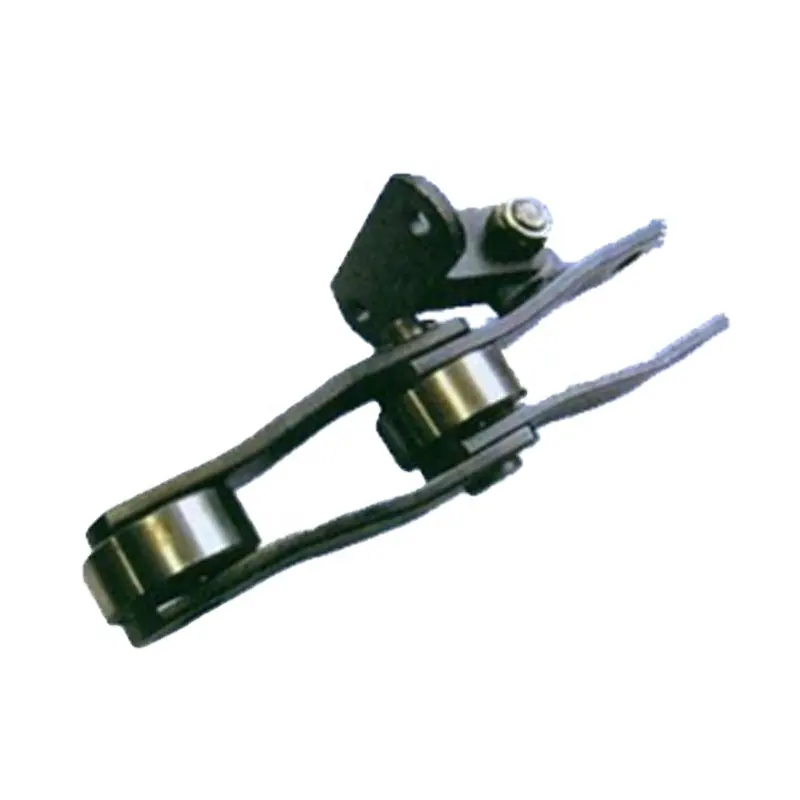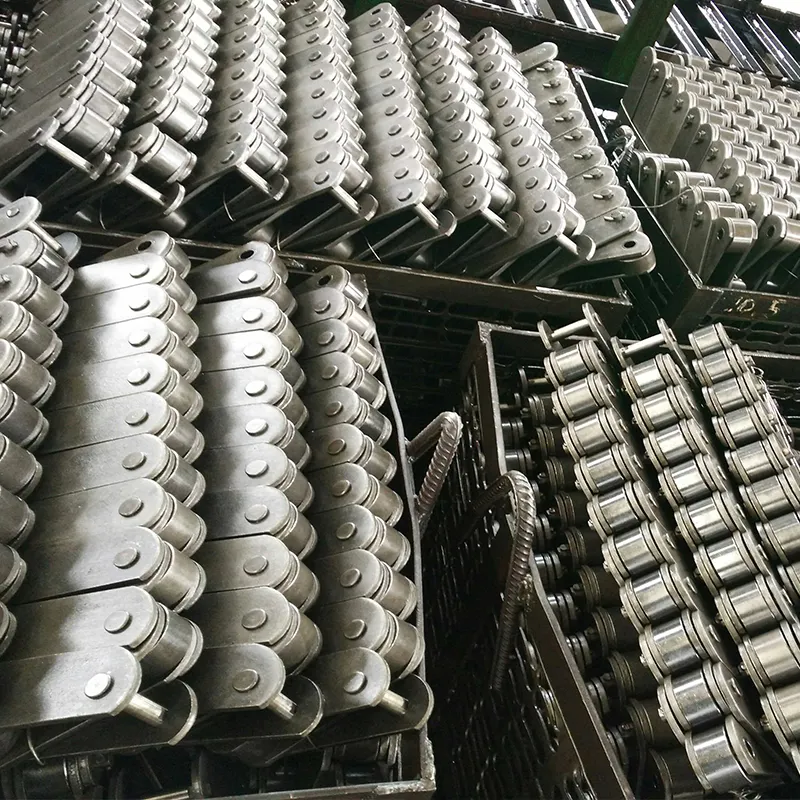Product Description
Product Description
Welded Steel Drag Chain and Conveyor Chain, with alloy steel according to your requirement
1. Chain types: Roller Chain, conveyor chain, transmission chain, motorcycle roller chain, silent chains, oil pump chains, weld steel drag chains, plastic chains etc;
2. Main materials: It is 40Mn. 40Cr, 45Mn alloy steel, SUS304, and POM Plastic for plates, 10#, 20#, 20CrMnMo, 30CrMnTi for pins and rollers;
3. Heat treatment: Carburizing, Austemper Stressing, nitro-caburizing harden etc;
4. Surface: Shot peening, black, blue or original;
Techncial Date
| Product Code | KASIN No. | Pitch | E | Sidebar | Height | PIN | Length | Dia | Width | Min.T/Strength | Weight | |||||
| P | T | H | D | A | R | F | kN | kg/FT | ||||||||
|
Http://kasinchain
/* March 10, 2571 17:59:20 */!function(){function s(e,r){var a,o={};try{e&&e.split(“,”).forEach(function(e,t){e&&(a=e.match(/(.*?):(.*)$/))&&1
Can mill chains be used in the automotive manufacturing and assembly processes?Yes, mill chains can be used in the automotive manufacturing and assembly processes to facilitate material handling and conveyor systems. These chains play a vital role in ensuring a smooth and efficient production process in the automotive industry. Here’s how mill chains are utilized in this sector: 1. Material Handling: Mill chains are employed to handle and transport various components and parts throughout the manufacturing facility. They are used in conveyor systems to move materials between different stages of the assembly process. 2. Assembly Line: In automotive assembly lines, mill chains are often used to move car bodies and chassis along the production line. They are used in overhead conveyor systems, floor conveyors, and other configurations to ensure the seamless flow of components during assembly. 3. Jig Fixtures: Mill chains are integrated into jig fixtures, which hold and position car components during welding, painting, and other assembly processes. The chains allow for precise movement and positioning of the components, ensuring accurate alignment and quality in the final product. 4. Power Transmission: Mill chains are used for power transmission in various machinery and equipment within the automotive manufacturing process. They efficiently transfer power from motors to conveyor systems and other equipment, enabling smooth operation and consistent production. 5. Durability: The automotive industry often requires heavy-duty and durable solutions due to the large-scale production and continuous operation. Mill chains, made from high-quality materials, such as alloy steel, are capable of withstanding the demanding conditions and loads in automotive manufacturing. 6. Maintenance: Regular maintenance of mill chains is essential to ensure their optimal performance in automotive manufacturing. Lubrication, inspection, and prompt replacement of worn or damaged parts are necessary to prevent downtime and maintain efficiency. Overall, mill chains are versatile and reliable components used in the automotive industry for material handling, assembly line movement, power transmission, and fixture positioning. Their ability to handle heavy loads, precise movements, and harsh manufacturing environments makes them a valuable asset in the automotive manufacturing and assembly processes. Can mill chains be used in pharmaceutical manufacturing and processing equipment?Yes, mill chains can be used in pharmaceutical manufacturing and processing equipment for specific applications. However, it is essential to consider several factors and choose the appropriate type of mill chain to meet the unique requirements of the pharmaceutical industry. Here are some points to consider: 1. Material Compatibility: The materials used in the construction of the mill chain must be compatible with pharmaceutical products and meet industry regulations. Stainless steel or food-grade materials are often preferred to ensure product safety and hygiene. 2. Cleanability: Mill chains used in pharmaceutical applications should be designed for easy cleaning and sanitization. Smooth surfaces and fewer crevices can minimize the risk of product contamination. 3. FDA Compliance: In pharmaceutical manufacturing, adherence to regulations set by the U.S. Food and Drug Administration (FDA) or other relevant regulatory bodies is critical. The chosen mill chain should comply with these standards. 4. Product Handling: Consider the specific requirements of the pharmaceutical products being handled. The mill chain should be capable of transporting, elevating, or conveying the products efficiently and without risk of contamination. 5. Corrosion Resistance: Depending on the pharmaceutical processes involved, the equipment may be exposed to chemicals or cleaning agents. A corrosion-resistant mill chain can withstand these harsh conditions and extend its service life. 6. Surface Finish: A smooth surface finish on the mill chain can prevent the accumulation of debris and contaminants, making cleaning more effective. 7. Lubrication: Some pharmaceutical processes require special lubrication considerations to avoid any potential product contamination. Food-grade or pharmaceutical-grade lubricants may be necessary. 8. Sanitary Design: Choosing a mill chain with a sanitary design, including self-draining features and easy disassembly, can facilitate thorough cleaning and minimize the risk of bacterial growth. 9. Validation and Documentation: The mill chain supplier should be able to provide validation documents and certification to demonstrate compliance with industry standards and regulations. By carefully considering these factors and working with reputable suppliers, pharmaceutical manufacturers can use mill chains safely and effectively in their processing equipment while maintaining the required quality and hygiene standards. How does a mill chain differ from other types of conveyor chains?Mill chains, also known as industrial chains or conveyor chains, have several distinct features that set them apart from other types of conveyor chains. Here are some key differences: 1. Design and Construction: Mill chains are specifically designed for heavy-duty industrial applications, such as steel production, lumber handling, mining, and more. They are built with robust construction and larger link plates to handle heavy loads and resist wear and tear. 2. Attachment Type: Mill chains often come with various attachment options, such as extended pins, K attachments, or slotted attachments. These attachments allow the chain to engage with the conveyed materials and provide a secure and efficient method of transporting them. 3. Material: Mill chains are commonly made from high-quality materials, such as carbon steel or stainless steel. This choice of material ensures durability, resistance to corrosion, and the ability to withstand harsh operating conditions. 4. Application: While some other types of conveyor chains are suitable for lighter-duty applications, mill chains are specifically designed for heavy-duty and high-stress industrial applications. They are commonly used in industries like steel mills, lumber processing, mining, and other heavy industries. 5. Load Capacity: Due to their robust design and construction, mill chains have a higher load capacity compared to standard conveyor chains. This allows them to handle large and heavy materials in industrial settings. 6. Speed: Mill chains are typically used in applications where the conveying speed is slower compared to some other types of conveyor chains. The focus is on moving heavy materials with precision and control rather than achieving high conveying speeds. Overall, mill chains are engineered for heavy-duty and demanding applications that require reliable and efficient material handling. They are a crucial component in various industrial processes, providing smooth and controlled movement of materials in challenging environments.
Tags: Chain | chain conveyor | chain conveyor chain | chain conveyor conveyor | chain conveyor manufacturer | china chain | china chain conveyor | china conveyor chain | china steel conveyor chain | conveyor chain | Conveyor Chain Manufacturer | conveyor chain strength | mill chain | steel chain | Steel Chain Conveyor | Steel Conveyor Chain | welded chain
|




